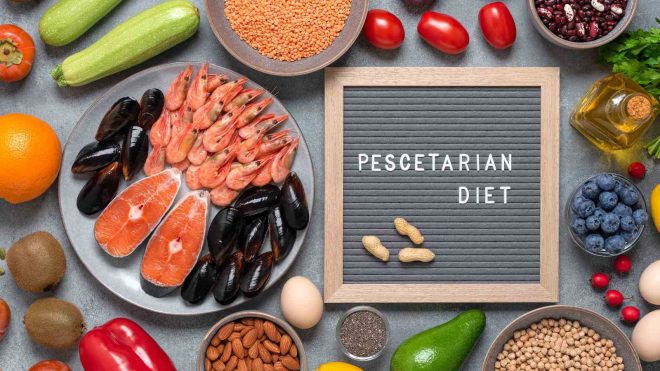
Pescatarian diet may extend your life! Know what to eat in a pesco-vegetarian diet
The pesco-vegetarian diet, or pescatarian, is the ultimate diet in the fitness world. From which foods to eat and avoid to their benefits and side effects, learn whether they’re trendy or popular.
If you’re on a new diet, the most obvious one is the pescatarian diet. A new study says such a diet may extend life by reducing the risk of disease in older people. Also known as a pesco-vegetarian, it’s a mostly vegetarian diet, but you can eat fish! This diet is a solid choice for those looking for a healthy diet. It’s a good combination for vegetarians and those on a high-protein diet. It keeps you healthy and balances your plate with salmon fillets, fruits, vegetables, legumes, grains, and more. Learn about the health benefits of a pescatarian diet and how to incorporate it into your diet.
What is a pescatarian diet?
The term pescatarian was coined in the early 1990s. It is a combination of two words: Pesce, Italian for fish, and vegetarian food. According to research published in the journal JAMA Internal Medicine, this diet falls under the umbrella of vegetarianism and is known as the “pesco vegetarian diet.”
Nutritionist Dr. Archana Batra explains that the pesco-vegetarian diet is a vegetarian diet that primarily includes fish and other seafood, but excludes land-based meat like beef, pork, and chicken. It also often includes fruits, vegetables, grains, legumes, nuts, and seeds, as well as dairy and eggs, depending on personal preference. This food is often preferred by people who want to reduce their meat intake but still need some animal protein and nutrients from seafood,” she added.

8 benefits of eating a pescatarian diet
There are many health benefits to consuming a pesco-vegetarian diet:
1. Promote heart health
A pescatarian diet often includes oily fish like salmon, mackerel, and sardines, all of which contain omega-3 fatty acids. Dr. Batra says eating a diet rich in omega-3 fatty acids can help reduce inflammation, lower blood pressure, and lower your risk of heart disease. A study published in the British Medical Journal (BMJ) found that eating a pescatarian diet may also reduce the risk of ischemic heart disease. The diet is also thought to lower cholesterol, which can lead to heart disease. A study in the British Journal of Nutrition found that people who followed a pescatarian diet had significant improvements in their cholesterol levels.
2. Live a longer life
Following a pescatarian diet may help you live longer. A recent study published in the American Journal of Clinical Nutrition looked at 88,400 participants and found a link between a pesto vegetarian diet and longevity. Pesco vegetarians have a lower risk of death in the elderly than non-vegetarians.
3. Improve your brain health
Pesco-vegetarian options are rich in fish, which contain omega-3 fatty acids thought to be good for brain health. According to research published in the journal Advances in Nutrition, fatty acids from fish, especially DHA and EPA, play an important role in improving cognitive and mental health. Experts say that following this diet may also reduce the risk of neurodegenerative diseases such as Alzheimer’s disease. It is also thought to improve your mood and overall health awareness.
4. Helps lose weight
It’s important to pay attention to what you eat when you’re trying to lose weight, and following a pescatarian diet can help! These foods are rich in fish protein and plant fiber, which can help increase satiety and help you control your weight. The combination of these nutrients can help you reduce your total calories and stay healthy in the long run. A study published in the Journal of Nutrition found that a diet rich in protein and fiber can help with weight loss and metabolic health.
5. Reduce your risk of diabetes
According to the National Institutes of Health (NIH), more than 38.4 million people of all ages will have diabetes by 2021, and this number is expected to increase in the future. Following a healthy lifestyle, including a healthy diet, can help you manage diabetes. A study published in the journal Diabetes Care found that a pesco-vegetarian diet can help prevent type 2 diabetes and control blood sugar.
6. Good for digestion
Eating a diet rich in fruits, vegetables, grains, and legumes improves digestion because it provides enough fiber for a healthy gut. According to research published in the journal Nutrients, dietary fiber found in whole grains, fruits, and vegetables can help improve digestion and improve bowel function by combating constipation and indigestion.
7. Strengthens Bones
A pescatarian diet is good for bone health because it includes fish and seafood, which are good sources of protein and calcium. A study published in the Journal of Nutrition found that combining a calcium-rich diet with regular exercise may help maintain healthy bones and reduce the risk of fractures. The pescatarian diet also includes vitamin D, an important nutrient for bones.
8. May prevent cancer
A diet rich in fruits, vegetables and fish, especially those with antioxidant and anti-inflammatory properties, can reduce the risk of some blood cancers such as stomach cancer. A study published by BMC Medicine revealed that a pescatarian diet has a positive effect against cancer. It can help reduce the risk of cancer, including colon cancer.
Foods to Include and Avoid on a Pescatarian Diet
Here are what nutritionists recommend you eat and avoid while on the pesco-vegetarian diet:
Foods to eat:
- Salmon
- Mackerel
- Sardines
- Trout
- Shrimp
- Clams
- Mussels
- Leafy greens
- Berries
- Citrus fruits
- Cruciferous vegetables
- Root vegetables
- Brown rice
- Quinoa
- Oats
- Barley and other whole wheat products
- Legumes (beans, lentils, chickpeas and peas)
- Almonds
- Walnuts
- Chia seeds
- Flaxseeds
- Pumpkin seeds
- Milk
- Yoghurt
- Cheese
- Olive oil
- Avocado
- Fish oil
Foods to avoid:
- Red meat – beef, pork, lamb and other mammalian meats.
- Poultry – chicken, turkey, duck and other poultry.
- Processed meat – sausage, bacon, ham and other meat products.
- Animal fats – lard, liver and other animal fats.
- Processed foods – foods containing added sugar, saturated fat and artificial energy.
- Beverages – soft drinks, sweet tea and soft drinks.
Are There Side Effects of Eating a Pesco-vegetarian Diet?
Although a pescatarian diet is considered healthy, there are some side effects of the diet that you should be aware of:
1. Exposure to Mercury
Did you know that fish absorb mercury from oceans and streams when you eat them? Due to water pollution, fish and shellfish absorb less mercury, which can be toxic to humans when exposed. According to the U.S. Food and Drug Administration (FDA), some fish contain more mercury than others, including shark, swordfish, fresh tuna, marlin, king mackerel, and tilefish. You should not eat too much of these fish to avoid exposure to mercury.
2. Malnutrition
Pesco vegetarian options are packed with nutrients but lack some nutrients typically found in red meat, such as iron and vitamin B-12. Dr. Batra recommends incorporating a variety of plant-based and doctor-recommended foods to reduce the risk of malnutrition.
3. Digestive issues
While eating fiber-rich foods can improve digestion, too much of anything can cause problems. A sudden increase in fiber or eating too much can upset your digestive system. A study published in the journal Nutrients found that too much fiber can cause digestive problems like gas, bloating, and abdominal pain.
Who should not eat a pescatarian diet?
Some people should not follow a fish diet for health reasons:
- People who are allergic to fish or shellfish.
- People with diseases such as gout should avoid fish that are high in purines.
- Although omega-3 fatty acids are beneficial for pregnant women, some fish also contain mercury, which can be harmful to the fetus. Therefore, pregnant women should not eat fish that contain mercury.
- People who avoid all animal products for ethical reasons may choose to follow a strict vegetarian diet instead of a pescatarian diet.
A pescatarian diet is healthy, but it does have its problems. Talk to your doctor before changing your diet, and don’t follow a diet that’s just popular.


